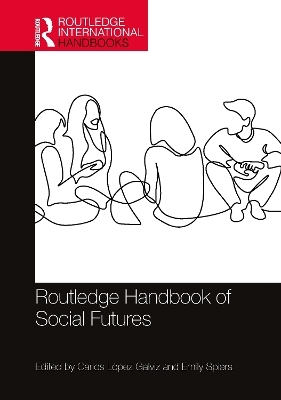
Routledge Handbook of Social Futures
Routledge (Verlag)
978-1-138-34033-6 (ISBN)
By presenting a range of futures work from contexts around the globe, the Handbook contextualizes techniques – forecasting, backcasting, scenario planning, collaboration and co-production– to ask how different dimensions of the social are created and circulated in the process. Through its thirty chapters, the volume explores and interrogates narratives, anticipations, enactments, ecologies, collaborations, prospections and so on to highlight which versions of the social are legitimized and which are encouraged and foreclosed.
This Handbook opens an important conversation about the centrality of the social in futures thinking. By bringing arts, humanities and social sciences scholars and practitioners into conversation with biologists, environmental, climate and computer scientists, this volume seeks to encourage new pathways across, between and within multiple disciplines to interrogate the futures we need and want. The social must be our starting point if we are to steer our planet in a direction that supports good lives for the many, everywhere.
Carlos López Galviz, PhD, is Senior Lecturer in the Theories and Methods of Social Futures at Lancaster University, UK. His books include Global Undergrounds (2016) and Cities, Railways, Modernities: London, Paris and the Nineteenth Century (2019). Emily Spiers, PhD, is Senior Lecturer in Creative Futures at Lancaster University, UK. They are the author of Pop-Feminist Narratives: The Female Subject under Neoliberalism in North America, Britain and Germany (2018) and the co-editor, with Tobias Boes and Rebecca Braun of World Authorship (2020).
Introduction: Why social futures? 1. A beginning: A critical history of scenarios 2. Agency: Futures literacy and Generation Z 3. AI: The social future of intelligence 4. Anticipation: Flourishing for the future 5. BioFutures: Where futurists and biologists meet 6. Borders: Retravelling Nickelsdorf 7. Climate change: Transformational adaptation in Bangladesh 8. Collaboration: Collaborative future-making 9. Data: The futures of personal data 10. Ecology: Thinking ecologically 11. Economics: Catalysing large-scale system change 12. Family: Homeland connections and family futures 13. Higher education: The future university 14. Inquiries: Healthcare futures 15. Lines: Material cultures of future mobility 16. Literary futures: What fiction can tell policy makers 17. Mental health: What can social futures teach us? 18. Mobility justice: Sustainable mobility futures 19. Multi-planetary worlds: Mobilities of the space age 20. Narrative: Telling social futures 21. Postcolonial futures: Urban eventualities 22. Prospection: Producing social futures 23. Publics: Infrastructuring proto-futures 24. Queering: Liberation futures with Afrofuturism 25. Smart cities: Policy without polity 26. Urbanism: Creating urban futures 27. Utopia: Futurity, realism and the social 28. Visible cities: Envisioning social futures 29. Walking futures: Following in the footsteps of mobility pioneers
| Erscheinungsdatum | 24.11.2021 |
|---|---|
| Reihe/Serie | Routledge International Handbooks |
| Zusatzinfo | 7 Line drawings, black and white; 23 Halftones, black and white; 30 Illustrations, black and white |
| Verlagsort | London |
| Sprache | englisch |
| Maße | 174 x 246 mm |
| Gewicht | 900 g |
| Themenwelt | Sozialwissenschaften ► Soziologie ► Spezielle Soziologien |
| Technik ► Umwelttechnik / Biotechnologie | |
| ISBN-10 | 1-138-34033-2 / 1138340332 |
| ISBN-13 | 978-1-138-34033-6 / 9781138340336 |
| Zustand | Neuware |
| Haben Sie eine Frage zum Produkt? |
aus dem Bereich


